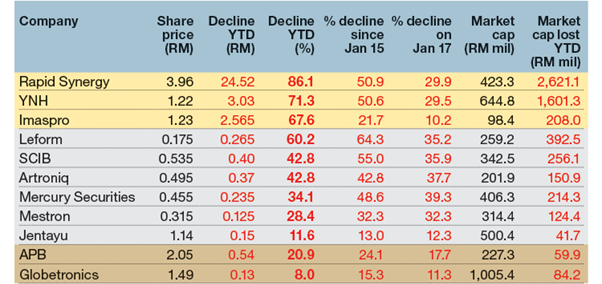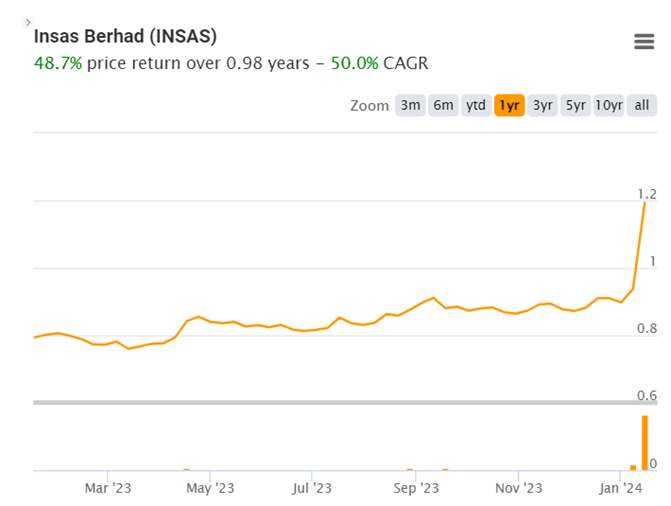Insas Warrants WC and Its Valuation kcchongnz
kcchongnz
Publish date: Mon, 22 Jan 2024, 03:11 PM
This article is for education purpose. It is not about how I made money (or lose money) buying any share mentioned, nor I have any intention of promoting any share, which I never do.
In the last couple of weeks, there were several stocks in Bursa linked to certain personalities encountered sharp selloff. These stocks met limit-downs, some in multiple times as shown below.

Even as of today, the bloodbath has not stopped yet.
On the contrary, another stock which many investors detested, Insas Holding, jumped by more than 30% in that short period of time from 90 sen to RM1.20 as shown in the chart below.

What has happened?
“In the short run, the market is a voting machine but in the long run, it is a weighing machine.”
― Benjamin Graham
On one hand, those stocks which tanked were mostly have been losing money in their businesses and have precarious balance sheet with huge debts (and major shareholders have high margin financing), but the other has been making money and has huge amount of cash and cash equivalent in its balance sheet. It is that simple.
Insas has 331 million of warrants, WC, outstanding with more than 2 years to expiry. The share price of Insas WC, a derivative of Insas, rose in tandem. In fact, its share price in fact more than double during the same period from 17 sen to 35 sen.
How come?
Which share should one invest in?
That boils down to how to value warrants.
Company warrants
Company warrants are derivatives, or financial instruments whose value depends upon and is derived from an underlying instrument, in this case the underlying share listed in Bursa. In other words, the values of the warrants are linked to the expected future price movements of the underlying share. They are used as tools for hedging, speculating, and arbitraging.
Warrants that give the right to buy a security are known as call warrants; those that give the right to sell a security are known as put warrants.
Company warrants are a type of call warrants issued by the company to raise money. They are normally initially issued “free” as a “sweetener" for a bond issue, preferred stock, or rights offering. It gives the holders the right, but not an obligation, to subscribe for new ordinary shares at a specified price during a specified period. Warrants have a maturity date (up to 10 years) after which they expire are worthless unless the holder subscribes for the new shares of the company before the maturity date. Warrants represent a potential source of equity capital in the future and can thus offer a capital-raising option to companies.
Company warrants are generally “American style” option which can be exercise any time by paying the exercise price and convert to the underlying shares before the expiry of the warrants.
If you are interested in the business of a company, should you invest in the common shares of the underlying company, or the company warrants?
To answer this, I strongly believe one must understand what warrants are and how their values are derived from the fundamental aspects in order to make an informed judgment of which to invest, rather than just looking at the technical chart, or just relying on supply and demand.
We will use Insas and its company warrant with the following prices on 21 January 2024 as example here to illustrate.
Profile of Insas warrant, WC
This is extracted from Bursa announcement in the link below,
Announcement details (bursamalaysia.com)
Insas Price P: RM1.20
Insas warrant WC: 35.0 sen
Exercise price: 90.0 sen
Exercise ratio: 1:1
Date of issue: 1 March 2021
Date of expiry: 28 February 2026
Issue size: 335.1 million shares
The Lingo
The price at which an underlying stock can be purchased or sold is called the strike price or exercise price (X). In Insas’s case, X is RM0.90. This is the price, S, a stock must go above (for calls) or go below (for puts) before a position can be exercised for a profit. All of this must occur before the expiry date.
Company warrants or call warrants are said to be in-the-money if the share price (S) is above the strike price (S>X). The intrinsic value is the difference between the underlying share price (S) and the exercise price (X). However, the IV cannot be a negative number, as the holder is not obliged to come out with additional money to exercise it and can just let the warrant expires without doing anything. Hence
IV = Max [S – X, 0]
IV of Insas warrant = Max [S-X, 0] = Max [1.20-0.90, 0] = 0.30
We say WC is in-of-the-money.
The total cost (the price) of a warrant above the market price of the underlying share is called the premium P.
Premium P = W + X - S
% P = (W + X - S) / S = (W + X) / S – 1
Where W is warrant’s price, X is exercise price and S is the underlying share price.
Premium of Insas warrant, P = 0.35 + 0.90 – 1.20 = 0.05
P% = (0.30 + 1.2) / 1.2 -1 = 4.2%
The lower the premium the more valuable is the warrant. If you can find a company warrant selling at a discount, you will likely make money by buying the warrant and convert it to the underlying share and sell it after that, provided the underlying share price does not go down before completion.
The two components of the price of a warrant are the intrinsic value (IV) and the time value (TV).
Price of warrant W = IV +TV
This price of the warrant is determined by factors including the underlying stock price, strike price, time remaining until expiration (time value) and volatility. The price of the warrant over and above the option's intrinsic value is referred to as time value, TV.
Time value of WC, TV = W – IV = 0.35 – 0.30 = 0.05
The more time to expiration, the greater the TV of the warrant. Investors are willing to pay a higher premium for more time as time increases the likelihood that the position can become profitable.
As the underlying share price moves further up, the warrants become deep-in-the-money, the time value decreases or even disappears and the value of warrant consists just the intrinsic value (S-X) and the movement of warrant solely dependable on movement of the underlying share. The time to maturity and volatility of the underlying share has negligible effect on the price of warrant then.
Why do people buy warrants instead of the underlying share?
Speculation
You can think of speculation as betting on the movement of share price. Speculation is the territory in which the big money is made - and lost. The use of warrants in this manner is the reason they have the reputation of being risky. This is because when you buy a warrant, you must be correct in determining not only the direction of the stock's movement, but also the magnitude and the timing of this movement. To succeed, you must correctly predict whether a stock will go up or down, and you have to be right about how much the price will change as well as the time frame it will take for all this to happen. And don't forget commissions! The combinations of these factors mean the odds are stacked against you.
So why do people speculate with warrants if the odds are so skewed? It is all about using leverage. When you are controlling 1,000,000 shares of warrants with high gearing, it doesn't take much of a price movement to generate substantial profits.
Gearing is the ratio of the share price to the warrant price.
Gearing = price of underlying share / Price of warrant = S / W
Gearing of Insas warrant is = 1.20 / 0.350 = 3.4 times
Gearing reflects how much the price of the warrant changes for a given change in the stock. The higher the gearing, the more valuable the warrant. This is because you can come out with a smaller outlay for a potentially higher gain.
Wish to know more about warrants and how to use it for leverage and financial risk management, and more important, a right fundamental approach in investing, avoiding those stocks which encountered multiple limit downs above, and having a higher probability of reasonable return investing in the stock market over the long-term?
Please go to my Facebook page, like and follow it.
https://www.facebook.com/kcchongnz/
KC Chong
Related Stocks
| Chart | Stock Name | Last | Change | Volume |
|---|
More articles on kcchongnz blog
Created by kcchongnz | Jan 15, 2024
Created by kcchongnz | Jan 01, 2024
Created by kcchongnz | Dec 25, 2023
Created by kcchongnz | Oct 02, 2022





















